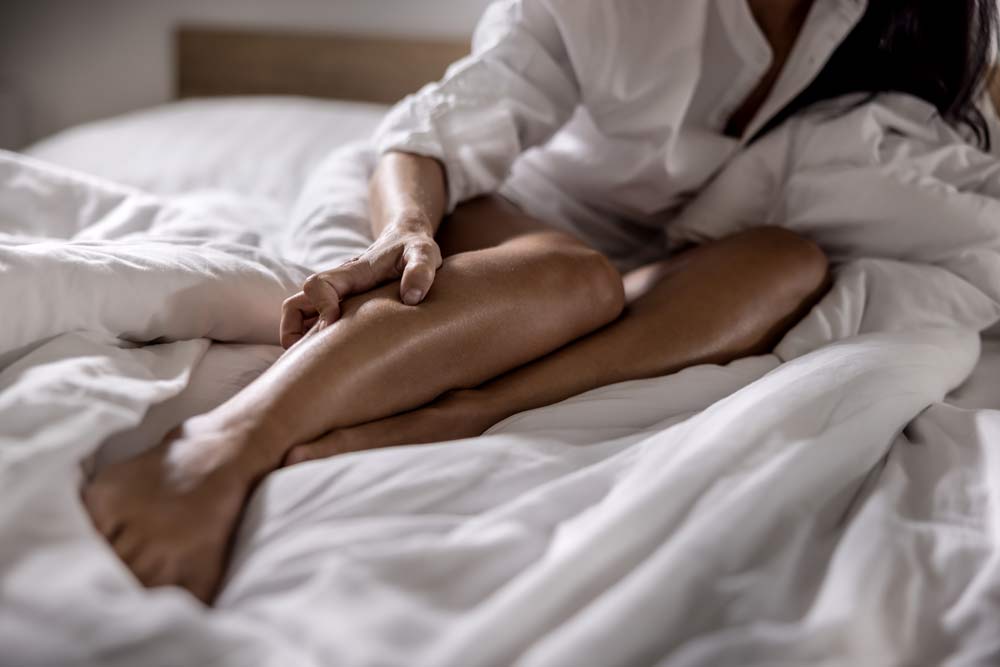
Whether it’s due to advanced age or the fact that most of us sit behind a desk for hours every week, chances are high that most people will experience leg cramps at night at some point in their lives. The thing about leg cramps is that they’re quite the wildcard. They typically strike out of nowhere, yet they’re mostly benign. And they’re pretty common, yet still poorly understood. Understandably, anyone who’s ever been pulled out of their sweet slumber by nighttime leg cramps will want answers. Here’s what we know.
Note: The content on Sleepopolis is meant to be informative in nature, but it shouldn’t be taken as medical advice, and it shouldn’t take the place of medical advice and supervision from a trained professional. If you feel you may be suffering from any sleep disorder or medical condition, please see your healthcare provider immediately. Additionally, restrictions and regulations on supplements may vary by location. If you ever have any questions or concerns about a product you’re using, contact your doctor.
Fast Facts on Leg Cramps
- Leg cramps are sudden contractions or tightening of a muscle, usually accompanied by pain. Leg cramps at night are the same muscle contractions and pain that occur at night. (1)
- Sedentary lifestyles, overexertion while exercising, and metabolic imbalances are common causes of leg cramps. (2, 3, 4)
- Interventions like stretching, massage, and hot or cold therapy may help treat leg cramps at night, but persistent pain and discomfort may warrant an appointment with your doctor.
What Are Leg Cramps?
Leg cramps are episodes of sudden, intense pain, usually caused by muscle tightening or contractions in the leg. Leg cramps can affect the calf muscle or muscles in the feet or thighs. (1) They can last anywhere from a few seconds to as long as 10 minutes, and while they’re not life-threatening, leg cramps can be incredibly painful. (1) In many cases, the pain from a leg cramp can linger on. (5)
Leg cramps at night are the same type of painful muscle leg contractions, but Dr. Dylan Petkus, M.D. says they “typically occur during periods of rest, especially at night, and can lead to significant discomfort and sleep disturbances.” (5)
Petkus also tells us that leg cramps and their alter-ego, Charley horses, are “essentially the same thing, with the term ‘charley horse’ typically referring to a more intense or painful cramp, often in the calf.” (6) He adds, “Both involve involuntary muscle contractions, though a Charley Horse might last longer or be more severe. “
Who Gets Leg Cramps?
Nocturnal leg cramps can happen to anyone at any age, but their prevalence increases with age. Of those over age 60, leg cramp prevalence ranges anywhere from 46 percent to 56 percent. (2) And while nocturnal leg cramps may be more common in older adults, that doesn’t mean kids are off the hook. Research indicates that 7 percent of children and adolescents may experience leg cramps. (7)
Women have higher incidences of leg cramps at night than men, and pregnancy is a known risk factor, with 30 to 50 percent of women experiencing leg cramps, particularly during the third trimester. (8) Research indicates as many as two‐thirds of pregnant women experience leg cramps 2 times per week, and that leg cramps at night may cause sleep loss and insomnia. (6)
What Causes Nighttime Leg Cramps?
Petkus says, “The exact causes of nocturnal leg cramps remain poorly understood, but potential contributors may include neurological conditions and metabolic imbalances. Lifestyle factors may also play a role.
Sedentary lifestyles. Our muscles need movement and exercise to remain in good working order, but increasingly sedentary lifestyles are pushing daily movement goals further and further away. Ultimately, sitting for long periods of time may cause leg cramps, especially leg cramps at night. (2)
Prolonged standing. Research suggests that prolonged standing for work may be a risk factor for leg cramps, too. And while the prevalence of leg cramps is generally higher in women, men outpace women for leg cramps associated with standing for work. (9)
Overusing your muscles. While a lack of physical activity has been linked to leg cramps, so too is overexertion. Daily exercise is good, but overworking your muscles may cause leg cramps. Also known as exercise-associated muscle cramps (EAMC), this type of leg cramp is pretty common. Like leg cramps unrelated to exercise, they are intense and unpredictable, and their duration varies. (3)
Dehydration, metabolic imbalances, and deficiencies. There is some evidence to suggest that dehydration and electrolyte imbalances may play a role in leg cramps. (4)
Medications That Cause Leg Cramps
While medications can help treat whatever ails us, you’d be hard-pressed to find one that doesn’t have side effects. Petkus tells us that leg cramps are a known side effect of diuretics, statins, and antidepressants.
Diuretics. “One of the most commonly cited classes of medications that can induce leg cramps are diuretics,” says Petkus. He adds that while these medications are often used to treat conditions such as hypertension and heart failure, they can lead to electrolyte imbalances, particularly hypokalemia (low potassium levels), which is a known risk factor for muscle cramps. (2)
Quinine. Petkus tells us that the very medicine “historically used for treating nocturnal leg cramps has also been associated with muscle cramping.” While noting that its use had declined, Petkus adds, “Quinine remains a notable example of a medication that can both alleviate and potentially exacerbate leg cramps, depending on individual patient factors and concurrent medications.” (3)
Statins. Commonly prescribed for cholesterol management, statins have been linked to muscle-related side effects, including cramps. (2)
Other medications that may cause leg cramps include:
- Beta-agonists (i.e. albuterol) (10)
- Antidepressants (particularly those affecting serotonin levels, like Sertraline (Zoloft®) and Fluoxetine (Prozac®)) (11, 12)
- Βeta-blockers (typically used to treat cardiovascular diseases) (2)
- Anti-epileptic drugs (2)
- Non-steroidal anti-inflammatory drugs (NSAIDs) (2)
When to Worry About Leg Cramps
If leg cramps are a one-off occurrence, there’s probably no need to worry, especially if you can trace it back to an understandable cause like standing for too long or a strain resulting from an overzealous workout session.
However, if leg cramps persist or leg cramps at night or consistently disrupt your sleep, it may be time to act. Noting that “persistent or severe cramps could indicate an underlying condition, such as peripheral artery disease, nerve compression, or a more serious electrolyte imbalance, Petkus suggests speaking with your doctor “if leg cramps become frequent, last longer than a few minutes, or are accompanied by swelling, redness, or muscle weakness.”
How to Treat Nighttime Leg Cramps
Leg cramps are a known sleep disruptor. And while frequent or severe leg cramps warrant a consult with your doctor, Petkus offers the following suggestions for more immediate relief.
Stretching. While he notes that regular stretching exercises, especially before bed, can help prevent leg cramps, Petkus says, “Forceful stretching of the affected muscle during a cramp can provide immediate relief.” (13)
Stretching for a Leg Cramp
- From a seated position, extend your leg straight out.
- Bending your foot so your toes are pointed up toward your knee.
- Roll a towel and place it under the ball of your foot.
- While holding the towel at both ends, keep your knee straight and gently pull the towel toward your chest. (14)
Heat and cold therapy. Hot or cold therapy may provide some immediate relief when a nighttime leg cramp strikes. While the choice may simply boil down to a matter of preference, just note: Heat relaxes a cramped muscle as it’s happening, while cold therapy post-cramp can be used to reduce soreness and inflammation. (15)
Take a warm bath. Warm baths can be viewed as just another approach to heat therapy. The net effect here is increased blood flow to your legs, which may offer some relief. Incidentally, a warm bath at night may also improve your sleep quality. (16)
Massage. Just as heat increases blood flow to the leg, offering some relief from leg cramps, a gentle massage can do the same. (17)
Sleep in a different position. Believe it or not, something as simple as sleeping positions may trigger leg cramps at night. So, if you’re prone to leg cramps, try to avoid sleeping in awkward positions that might restrict blood flow to your legs.
Roll your leg muscles. To help release tension and prevent cramps, Petkus suggests using a foam roller to roll out your leg muscles before bed.
How to Prevent Leg Cramps
Leg cramps at night can be intensely painful, so for those who prefer prevention over a cure, Petkus suggests the following.
Stay hydrated. Noting that dehydration can cause muscle contractions, Petkus says maintaining proper hydration throughout the day is key to keeping them at bay. (4)
Stretch before bed. A firm stretch can help relieve leg cramps, but gentle leg stretches before sleep can help prevent them. (13)
Maintain a balanced diet. Mineral deficiencies (i.e., potassium, calcium, and magnesium) can lead to cramping, but a balanced diet can do some pretty heavy lifting to stop them before they start. (4)
Avoid sitting or standing for long periods. We know that sedentary lifestyles and standing for prolonged periods may cause leg cramps, so to keep them in check, Petkus suggests moving around throughout the day to keep your muscles engaged. (2)
Wear supportive footwear. Petkus suggests wearing proper footwear during the day to prevent leg cramps at night. Noting that “Shoes with good arch support can help reduce muscle fatigue and cramping, he adds that supportive footwear is especially important during exercise or periods of prolonged standing.”
Exercise — but take breaks as needed. Engaging in regular physical activity and avoiding long periods of inactivity can improve overall muscle tone and reduce cramping episodes (2). And while exercise is good, overworking your muscles can lead to cramping at night, so Petkus suggests taking breaks as needed and giving yourself time for adequate recovery.
Address electrolyte imbalances. “Electrolyte imbalances can contribute to muscle cramps,” says Petkus. So, those who suffer from frequent leg cramps might consider taking a closer look at the state of their electrolyte intake, address deficiencies, and smooth out the edges as needed. (4)
Limit alcohol. Legs cramps at night have been linked to alcohol consumption, so you might want to reconsider your nightly negroni. (2)
Try A Vitamin Supplement. While the research seems to be a bit dated, some evidence suggests that vitamin K2 and B Complex may be useful for treating nighttime leg cramps.
Medication and Supplements that Help with Leg Cramps
Quinine has long been a solid treatment for leg cramps; however, its safety has come under fire over the years, with the FDA issuing warnings against its use for leg cramps due to some pretty serious side effects. (20)
Those looking for safer treatments and supplements for leg cramps may find relief in the following.
Note: It’s important to speak with a qualified medical provider before beginning any type of medication or supplement.
- Vitamin B complex (18)
- Vitamin K2 (19)
- Carisoprodol: A muscle relaxer (21)
- Orphenadrine: For muscle spasms, stiffness, and pain (21)
All across the internet, many sources suggest that magnesium may be a useful supplement for treating leg cramps. However, our research yielded no solid evidence for using magnesium supplements in this case. (22,23)
What do leg cramps feel like?
Leg cramps are episodes of sudden, intense pain, usually caused by muscle tightening or contractions in the leg. Leg cramps can affect the calf muscle or muscles in the feet or thighs. Leg cramps can last anywhere from a few seconds to as long as 10 minutes, and while they’re not life-threatening, they can be incredibly painful.
Can leg cramps be cured?
While theories on causality and treatment abound, leg cramps are still poorly understood by the scientific community. As such, there is no cure for leg cramps per se. However, the condition can be managed effectively through a series of lifestyle modifications, dietary changes, and interventions for acute occurrences.
Does potassium deficiency cause nighttime leg cramps?
Research indicates that electrolyte imbalances may contribute to leg cramps, and potassium (along with sodium, chloride, magnesium, calcium, phosphate, and bicarbonates) is an electrolyte. From this, we might conclude that a potassium deficiency may cause nighttime leg cramps.
The Last Word From Sleepopolis
Leg cramps at night are so common that most of us will likely experience one at some point in our lives. Rest assured, though, that these intense pains are fleeting. With quick resolutions like stretching massage, you can help yourself get through them and get back to sleep in no time.
Sources
- NHS. (n.d.). NHS choices. https://www.nhs.uk/conditions/leg-cramps/
- Delacour C, Chambe J, Lefebvre F, et al. Association between physical activity and Nocturnal Leg Cramps in patients over 60 years old: a case-control study. Sci Rep. 2020;10(1):2638. Published 2020 Feb 14. doi:10.1038/s41598-020-59312-9
- Maughan RJ, Shirreffs SM. Muscle Cramping During Exercise: Causes, Solutions, and Questions Remaining. Sports Med. 2019;49(Suppl 2):115-124. doi:10.1007/s40279-019-01162-1
- Therkildsen ER, Kaster P, Nielsen JB. A scoping review on muscle cramps and spasms in upper motor neuron disorder-two sides of the same coin?. Front Neurol. 2024;15:1360521. Published 2024 Mar 1. doi:10.3389/fneur.2024.1360521
- Hallegraeff, J., & De Greef, M. (2020). Pilot testing a stretching regimen for prevention of night time nocturnal leg cramps. Geriatric Nursing, 41(2), 105-109. https://doi.org/10.1016/j.gerinurse.2019.07.010
- Patient-Reported Prevalence, Characteristics, and Impact of Leg Cramps in an Urban Primary Care Clinic. Birgit Khandalavala, Jenenne Geske, Jacob Klein. The Annals of Family Medicine Sep 2023, 21 (5) 440-443; DOI: 10.1370/afm.3013
- Lam CSE, Zhang M, Lim I. Primary care approach to calf cramps. Singapore Med J. 2022;63(12):746-752. doi:10.4103/SINGAPOREMEDJ.SMJ-2021-343
- Luo L, Zhou K, Zhang J, Xu L, Yin W. Interventions for leg cramps in pregnancy. Cochrane Database Syst Rev. 2020;12(12):CD010655. Published 2020 Dec 4. doi:10.1002/14651858.CD010655.pub3
- Bahk, Jin & Kim, Hyunjoo & Jung-Choi, Kyunghee & Jung, Myung-Chul & Lee, Inseok. (2011). Relationship between prolonged standing and symptoms of varicose veins and nocturnal leg cramps among women and men. Ergonomics. 55. 133-9. 10.1080/00140139.2011.582957.
- NHS. (n.d.-a). NHS choices. https://www.nhs.uk/conditions/bronchodilators/side-effects/
- Mayo Foundation for Medical Education and Research. (2024b, September 1). Sertraline (oral route) side effects. Mayo Clinic. https://www.mayoclinic.org/drugs-supplements/sertraline-oral-route/side-effects/drg-20065940
- Mayo Foundation for Medical Education and Research. (2024a, September 1). Fluoxetine (oral route) side effects. Mayo Clinic. https://www.mayoclinic.org/drugs-supplements/fluoxetine-oral-route/side-effects/drg-20063952
- Vijay Pawar, A., Bathia, D. K., Rayjade, D. A., & Patil, D. S. (2021). Effect of Calf Stretching Versus Heel Walking in Nocturnal Leg Cramps in Older Individuals: Life Sciences-Physiotheraphy. International Journal of Life Science and Pharma Research, 11(1), L5-L8. https://doi.org/10.22376/ijpbs/lpr.2021.11.1.L5-8
- Nighttime Leg Cramps: Care instructions. Nighttime Leg Cramps: Care Instructions | Kaiser Permanente. (n.d.). https://healthy.kaiserpermanente.org/health-wellness/health-encyclopedia/he.nighttime-leg-cramps-care-instructions.abs1415
- Kesik, G., Ozdemir, L., Yıldırım, T., Jabrayilov, J., & Çeliksöz, G. (2023). Effects of warm or cold compresses applied to the legs during hemodialysis on cramps, fatigue, and patient comfort: A placebo-controlled randomized trial. Hemodialysis International, 27(2), 117-125. https://doi.org/10.1111/hdi.13070
- Haghayegh, S., Khoshnevis, S., Smolensky, M. H., Diller, K. R., & Castriotta, R. J. (2019). Before-bedtime passive body heating by warm shower or bath to improve sleep: A systematic review and meta-analysis. Sleep Medicine Reviews, 46, 124-135. https://doi.org/10.1016/j.smrv.2019.04.008
- Imani, A., Saeedi abo-s-haghi, M., Alidadi, M., & Shafiei, E. (2021). Comparing the Effects of Lavender Oil and Olive Oil Massage on Pain due to Muscular Cramp during Hemodialysis. Iraqi Journal of Pharmaceutical Sciences( P-ISSN 1683 – 3597 E-ISSN 2521 – 3512) , 30(1), 163-168. https://doi.org/10.31351/vol30iss1pp163-168
- Chan, P., Huang, Y., Chen, J., Huang, P., & Liu, C. (1998). Randomized, Double-Blind, Placebo-Controlled Study of the Safety and Efficacy of Vitamin B Complex in the Treatment of Nocturnal Leg Cramps in Elderly Patients with Hypertension. The Journal of Clinical Pharmacology, 38(12), 1151-1154. https://doi.org/10.1177/009127009803801210
- Xu, D., Yang, A., Ren, R., Shan, Z., Li, Y. M., & Tan, J. (2022). Vitamin K2 as a potential therapeutic candidate for the prevention of muscle cramps in hemodialysis patients: A prospective multicenter, randomized, controlled, crossover pilot trial. Nutrition, 97, 111608. https://doi.org/10.1016/j.nut.2022.111608
- Is there hope for leg cramp sufferers? Harvard Health. (2017, February 14). https://www.health.harvard.edu/newsletter_article/is-there-hope-for-leg-cramp-sufferers
- Leg Cramps. Cleveland Clinic. (2024, September 9). https://my.clevelandclinic.org/health/diseases/14170-leg-cramps
- Garrison SR, Korownyk CS, Kolber MR, Allan GM, Musini VM, Sekhon RK, Dugré N. Magnesium for skeletal muscle cramps. Cochrane Database Syst Rev. 2020 Sep 21;9(9): CD009402. Doi: 10.1002/14651858.CD009402.pub3. PMID: 32956536; PMCID: PMC8094171.
- Moretti A. What is the role of magnesium for skeletal muscle cramps? A Cochrane Review summary with commentary. J Musculoskelet Neuronal Interact. 2021;21(1):1-3.
- Shrimanker I, Bhattarai S. Electrolytes. [Updated 2023 Jul 24]. In: StatPearls [Internet]. Treasure Island (FL): StatPearls Publishing; 2024 Jan-. Available from: https://www.ncbi.nlm.nih.gov/books/NBK541123/
Petkus, Dylan. Author Interview. September 10, 2024.



























